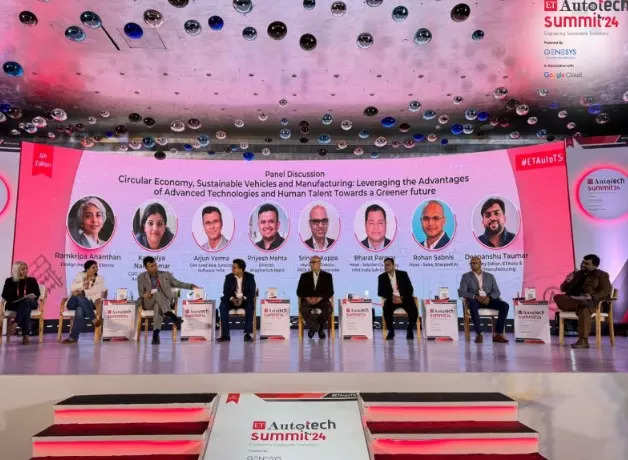
New Delhi: In the past few decades, technological advancements in India have been a trend, paving the way for exploring more sustainable opportunities across sectors. Sustainability in the Indian auto industry can be established through proper manufacturing with a circular economy kept in the background along with the upskilling of human resources, says industry experts. Circular economy is a process of extensively using the material in all the stages (production, consumption, and recycling).This economic scenario not only brings sustainability but also reduces the cost of manufacturing and ownership states, Kausalya Nandkumar, COO, Mahindra Electric Automobile Ltd. “As a business, that’s so perceivable, tangible that it would make sense for all of us to embark on that journey. I feel since it makes so much economic sense because there’s so much data that tells you if you were to use recycled, refurbished, and remanufactured items, it reduces cost of manufacturing, it reduces cost of ownership,” Nandkumar added.
If India wants to be technologically free, i.e. develop technologies in-house instead of following the West, we need a circular economy, said Kripa Ananthan, Head of Design, Ola Electric, during the ETAuto Tech Summit 2024 in Bangaluru. “If we start developing technology now, then we will be using our technology, and we’ll be in the forefront,” Ananthan added.
At the designing stage itself of the product, you can promote sustainability. “You have to build it into the design that you either extend the life, you can reuse, you can repurpose, you can remanufacture.”
Indian consumers buy any vehicle to run it for a longer period, thus sustainability is something that can’t be kept away while designing the vehicle. “It’s such a tricky balance because you want the same functionality, enhanced touch, but you want it with responsible materials at a price that customers will enjoy owning the product. If it becomes prohibitively expensive, then no one’s going to be able to own that product,” added Kausalya.
Talking more about how India can be a setting example for a circular economy Srinath Koppa, MD, Prolim Solutions Ltd, said, “I think as long as all of us are doing our part, the future is going to be circular, for sure. And when it comes to recycling, I think India is one of the few countries where you get money back when you recycle.”
This economic model would encourage sustainability as a whole in which ESG (environment, sustainability, and government) plays a crucial role. Supporting this, Bharat Parmar, Head, Solution Consulting, Infor India Sub-Continent, said, “We should talk about how we dispose of the waste, how much energy is spent to dispose of that waste.”
However, the circular economy in the Indian auto industry has a huge room for improvement. One such question is how do you get rid of lithium-ion batteries used in electric vehicles (EVs)?
“I think there is a lot to be done in terms of recyclability (in the auto industry). The first aspect is the battery, and the other can be also largely dependent on a mono-material sort of manufacturing as well,” Arjun Verma, Geo Lead Asia, Synchron Software India, said.
Sustainability in the auto industry
“Indian consumers are typically buying much more for convenience than the thought process of saving the planet,” Rohan Sabnis, VP- Sales, Sharpsell.ai, said. Indians’ preference for EVs has a different reason than what the Western countries have when we talk about mass segment, he added.
Thus to create sustainability India needs to promote it using the by-products. That means a by-product of one industry becomes a raw material for another industry. “I think there is a need for the industrial forum to sort of wake up to it and act more vigilantly so that these by-products can be used and recycled. I think those are some of the levers which can help better recyclability and hence sustainability, “ Koppa added.
Upskilling of human resources
For India to be fully independent, the country requires independence in manufacturing with the latest technology to make it fully efficient. However, Priyesh Mehta, Director, Imaginarium Rapid believes India lacks the ‘maker mentality’.
Indian people are shifting towards operations rather than the manufacturing of products. “It’s getting really difficult for us to find young, smart people who want to work on mechanical engineering jobs. They want to design something or simulate something, but manufacturing products has become a challenge for us”.
To overcome this challenge, Sabnis believes, something has to be done at the grassroots level, not just at an urban level. Another way is educating students at the university level, says Mehta.
The customer preference of Gen Zs is no longer only on fuel economy but also on advanced technological features like ADAS. For that, human resources should be at par with designing and working with digital transformations, added Ananthan.
However, sustainability in the workforce can be promoted via intent as an economy, as an industry, that we have to reskill and upskill the current workforce, added Nandkumar.
“It’s also about, right from design up to after sales and service, we are having to reskill every single value chain holder. And for that, one of the things that has been supported is digital tools, and using those tools to accelerate that,” she added.


